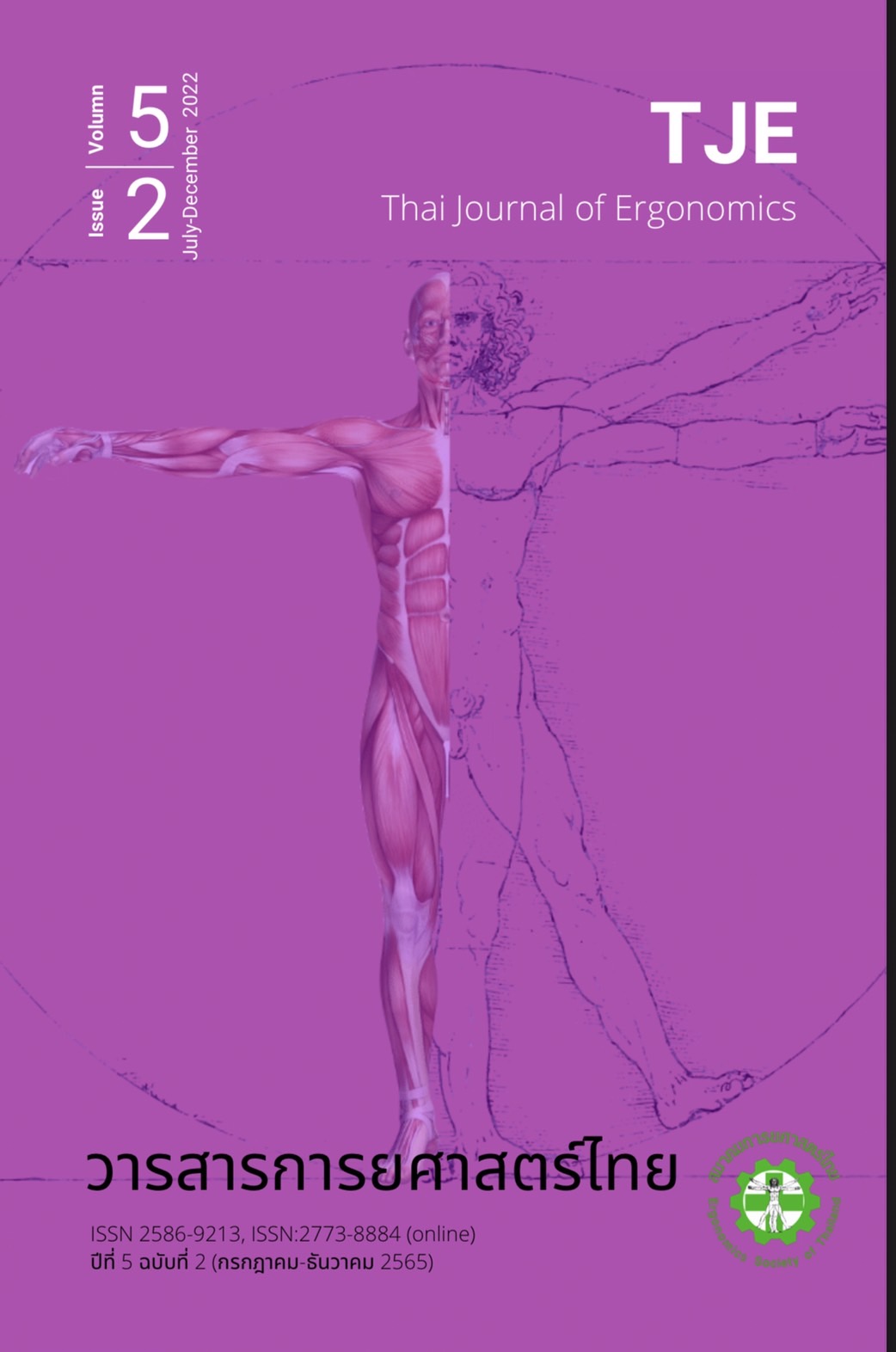Review of Human Factors Psychology Assessment Techniques
Main Article Content
Abstract
Human factors assessment is important to help designing task, working process, equipment, work-station, and work environment. As a result, it can enhance work performance, decrease human error and prevent accident at work. Regarding to a literature review, it was a limited article about Human Factors Psychology Assessment Techniques publishing in Thailand. The objectives of this article were to collect and publish types of human factors psychology, assessment techniques. There are many types of Human Factors Psychology Assessment Techniques. In this article, Human Factors Psychology Assessment Techniques were categorized by purpose into four types including i) Task Analysis Techniques; ii) Human Error Identification (HEI) Techniques; iii) Situation Awareness (SA) Assessment Techniques and iv) Mental Workload Assessment Techniques (MWL). The article also provided some examples of methods, domains of application, tools needed, validation studies, advantages and disadvantages. Human factors and ergonomics researchers in Thailand and other relevance can use this guideline to select appropriate human factors psychology assessment techniques.
Article Details

This work is licensed under a Creative Commons Attribution-NonCommercial-NoDerivatives 4.0 International License.
References
International Ergonomics Association (IEA). What is Ergonomics? [internet]. Switzerland. International Ergonomics Association; 2022 [cited 2022 May 1]. Available from: https://iea.cc/what-is-ergonomics/.
Butmee T. Review of cognitive ergonomics assessment methods. TJE. 2021;4(2):75-8. (in Thai).
Stanton NA, Salmon PM, Rafferty LA, Walker GH, Baber C, Jenkins DP. Human factors methods: a practical guide for engineering and design: 2nd ed. New York: Ashgate Publishing Ltd; 2013.
Endsley MR. Towards a theory of situation awareness in dynamic systems. Hum Factors. 1995; 37:32-64.
Annett J. Hierarchical task analysis (HTA). In: Stanton NA, Hedge A, Brookhuis K, Salas E, Hendrick HW. editors. Handbook of human factors and ergonomics methods. New York: CRC Press; 1971. p. 355-63.
Card SK, Moran TP, Newell A. The psychology of human computer interaction. New Jersey: Lawrence Erlbaum Associates; 1983.
Embrey DE. SHERPA: A systematic human error reduction and prediction approach. International Meeting on Advances in Nuclear Power Systems; 1986 Apr 21-24; Knoxville, Tennessee; 1986.
Marshall A, Stanton NA, Young MS, Salmon PM, Harris D, Demagalski J, et al. Development of the human error template – a new methodology for assessing design induced errors on aircraft flight. London: Department of Trade and Industry; 2003.
Isaac A, Shorrick ST, Kirwan B, Human error in European air traffic management: The HERA project. RSS. 2002;75:257-72.
Williams JC. HEART – a proposed method for assessing and reducing human error. 9th Advances in Reliability Technology Symposium; June 1986; UK. Birmingham: NEC; 1986.
Endsley MR. Measurement of situation awareness in dynamic systems. Hum Factors. 1995;37: 65-84.
Vidulich MA, Ward GF, Schueren J. Using Subjective Workload Dominance (SWORD) technique for projective workload assessment. Hum Factors. 1991;33 (6):677-91.
Durso FT, Hackworth CA, Truitt T, Crutchfield J, Manning CA. Situation awareness as a predictor of performance in en route air traffic controllers. ATCQ. 1998;6:1-20.
Hart SG, Staveland LE. Development of a multi-dimensional workload rating scale: results of empirical and theoretical research. In: P. A. Hancock & N. Meshkati, editors. Human mental workload. Amsterdam: Elsevier; 1988. p. 139-83.
Wierwille W, Casali JA. Validated rating scale for global mental workload measurement applications. Proceedings of the Human Factors society Annual Meeting; 1983 Oct 1; Sage CA. Los Angeles: Sage Publications; 1983.
Reid GB, Nygren TE. The subjective workload assessment technique: A scaling procedure for measuring mental workload. In; Hancock PS, Meshkati N. editors. Human mental workload. Amsterdam: Elsevier; 1988. P. 185-218.
Vidulich MA, Hughes ER. Testing a subjective metric of situation awareness. Proceedings of the Human Factors Society 35th Annual meeting; 1991 Sep 1; Sage CA. Los Angeles: SAGE Publications; 1991.
Roscoe A, Ellis GA. Subjective rating scale for assessing pilot workload in flight. Farnborough, UK: RAE; 1990 [cited 2022 Jun 1]. Available from: https://apps.dtic.mil/sti/citations/ADA227864.


